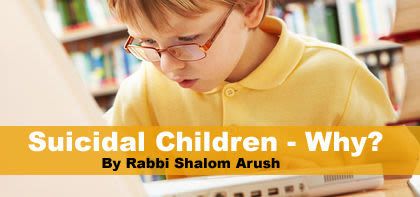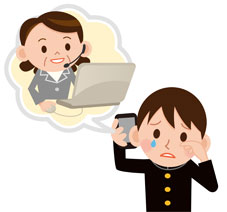
Suicidal Children – Why?
But just as a person must seek forgiveness from those he or she harmed during the year, they must seek the forgiveness of their own children; there is no license to harm them...

Translated by Rabbi Lazer Brody
Parents must know that their children are not their possessions to do with as they see fit. A parent is not allowed to insult a child or to cause a child anguish. Doing so is an outright violation of Torah known as issur ona’at devarim. It is not at all simple to atone for hurting a child, especially if the child is below the age of Bar- or Bat Mitzva. But just as a person must seek forgiveness from those he or she harmed during the year, before Yom Kippur, they must seek the forgiveness of their own children for hurting them. This is no joke.
Once, I counseled a child of eleven who wanted to commit suicide! Where have you heard of such a thing?! His parents brought him to me, but he did not want to get out of the car. He didn’t want to speak to me or anyone else for that matter. I finally went out to the car and spoke to him. I showered endless love upon him until he opened up to me and said to me straight-out that his suicidal intention came from being so criticized at home and from being called such insulting names. And then, when the parents moved him from the school that he loved to a different school where the teachers and students were constantly criticizing and ridiculing  him, he couldn’t handle it. He asked me to convince his parents to return him to his original school, in the original city where they lived.
him, he couldn’t handle it. He asked me to convince his parents to return him to his original school, in the original city where they lived.
All the criticism and ridicule, both from school and home, broke the child’s spirit and his will to live. Once he lost the will to live, He certainly could not be expected to learn or function. I lavished him with unconditional love, and searched for things to say that would revive his spirit. I told him how special and likable he was, justified him, and promised to help him. But as soon as the meeting was over, and he had to return to real life and his non-receptive parents, he lost his will to live again. I’m sorry that the story doesn’t have a happy ending.
The child’s situation hurt me so badly that I would have been happy for him to remain with me. Then I could indulge him, buy him things, and tell him I don’t want anything from him except to love and care for him. I would take him with me and praise him for every little thing that he did. In my mind, this is how I would heal him, rebuilding his confidence and self-image until he could return to a normal life.
Another student told me that at fourteen he tried to kill himself! Why? He had terrible pressure from his father who was very strict. When his father came home from work, he’d come home with a scary, angry face, and yell at his son about all sorts of things that his son didn’t do right: he didn’t clean up after himself, he didn’t do his homework, and so on. The student told me that his mother was very gentle. When his father was at work he felt fine, but he knew it was only a matter of time until his father would come home. He had tremendous fear from that moment, and when he heard the sound of his father’s car, his heart would sink.
The tension was so bad, and he felt so sad and depressed, that he decided to end his life. He went to the pharmacy and succeeded in convincing the pharmacist to give him sleeping pills, saying that it was for his father. He went to an abandoned home that he and his friends used to play at sometimes, and he wrote a letter stating that his life wasn’t good, and he didn’t care if he died if he suffering so much. He was interested in finding out if there was life after death (he was completely not religious) or not, so what does he have to lose? Even better, he’d be spared a life full of suffering.
He swallowed the sleeping pills and fell into a deep sleep for many hours. It seems that the pharmacist didn’t give him such strong pills, as he awoke after many hours completely disoriented. Afterwards, it seems that his parents found his letter and cried, repenting sincerely. From that day on, his father did not make one critical remark, and allowed the child to do whatever he wanted. As a secular Jew, the son began doing the silliest things, but even so his soul was saved, and later he became observant and upright. Parents must understand what they can cause! Children are living, feeling beings! One may not oppress them!
Our children don’t belong to us – they belong to Hashem. Hashem entrusts us with their safe-keeping. One of our most important New-Year’s resolutions should be to resolve to be better parents – less anger and insults, and more love! Gmar Chatima Tova!










Tell us what you think!
Thank you for your comment!
It will be published after approval by the Editor.